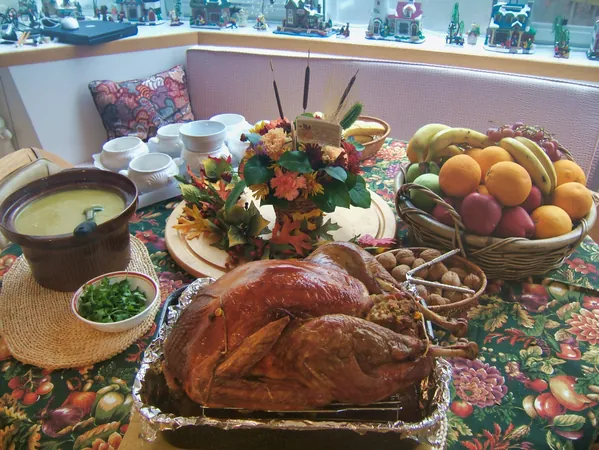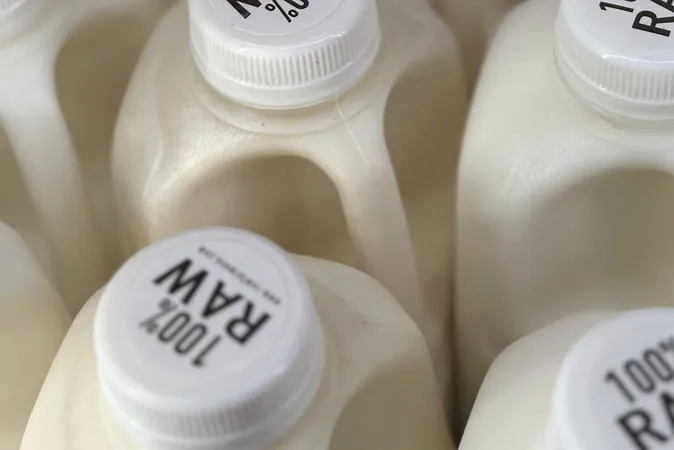
Is Your Thanksgiving Turkey Safe to Eat Amid Bird Flu Warnings? Experts Weigh In!
2024-11-27
Author: Michael
As Thanksgiving approaches, many families across California are questioning the safety of their holiday turkey due to ongoing bird flu outbreaks.
With poultry farms grappling with the highly pathogenic avian influenza (HPAI), concerns surrounding food safety have never been more pronounced this festive season.
The avian influenza virus, first identified in the United States in January 2022, has now been detected in both wild and domesticated birds, leading to significant interventions by state and federal agriculture officials. As of November 18, 294 dairies in California are under quarantine, with over 4 million birds—including turkeys and chickens—culled in efforts to contain the virus's spread. This drastic measure aims to protect both livestock and public health.
Concerns were amplified recently when the California Department of Public Health revealed that the bird flu virus was also detected in a batch of raw milk from Fresno County. This revelation has heightened public anxiety regarding foodborne illnesses during the holiday season.
What You Need to Know About Bird Flu
The U.S. Food and Drug Administration (FDA) describes highly pathogenic avian influenza (HPAI), often called bird flu, as a highly contagious viral disease primarily affecting birds, particularly poultry. While the virus poses a serious threat to bird populations, the risk to humans remains low. The FDA emphasizes that "highly pathogenic" refers to the impact on birds—not necessarily on human health.
Human infections are rare and typically arise when the virus is transmitted through direct contact with infected birds or contaminated environments, rather than through eating poultry products. Symptoms in humans can range from mild flu-like symptoms to severe illness, but health experts assure that with proper food hygiene, the likelihood of transmission is minimal.
Can You Safely Enjoy Turkey This Thanksgiving?
Yes! Food safety experts, including María Soledad from the U.S. Department of Agriculture (USDA), reassure consumers that "turkey for the holidays is safe to eat." Infected birds are not processed for consumption; they are destroyed on-site to prevent any entry into the food supply.
The FDA further states that the chance of infected poultry reaching consumers is significantly low, thanks to rigorous testing and inspection protocols in place across poultry farms. When properly prepared and cooked, there’s virtually no risk of contracting HPAI from turkey. The USDA mandates that cooking poultry to an internal temperature of 165 degrees Fahrenheit effectively neutralizes any traces of the virus.
Essential Tips for Safe Turkey Preparation
To ensure your Thanksgiving turkey is safe, follow these critical food safety practices:
1. **Clean**: Always wash your hands, utensils, and surfaces thoroughly before and after handling food.
2. **Cook**: Use a meat thermometer to ensure the turkey is cooked to the safe internal temperature of 165°F.
3. **Chill**: Refrigerate leftover turkey within two hours to prevent bacterial growth.
4. **Separate**: Use different cutting boards for raw meat and other foods to avoid cross-contamination.
What About Eggs and Dairy?
The good news extends to eggs and dairy products. Eggs sourced from commercial suppliers are pasteurized, eliminating bacterial risks associated with avian influenza. The FDA confirms, "There is no evidence that the virus can be transmitted to humans through properly prepared food."
For dairy, pasteurization has long been a standard practice that effectively kills harmful pathogens, making pasteurized milk and cheese safe to consume during the holiday festivities.
Conclusion: Celebrate with Confidence!
While bird flu remains a concern for poultry industries, experts unanimously agree that the turkey on your Thanksgiving table poses no real risk to your health, provided you follow safe food handling guidelines. As you prepare for the holiday, relish the joy of a delicious meal without fear, and remember: safe cooking and good hygiene are your best allies.
Let this Thanksgiving be a celebration of gratitude and safety, with your turkey being the star of the show!









 Brasil (PT)
Brasil (PT)
 Canada (EN)
Canada (EN)
 Chile (ES)
Chile (ES)
 España (ES)
España (ES)
 France (FR)
France (FR)
 Hong Kong (EN)
Hong Kong (EN)
 Italia (IT)
Italia (IT)
 日本 (JA)
日本 (JA)
 Magyarország (HU)
Magyarország (HU)
 Norge (NO)
Norge (NO)
 Polska (PL)
Polska (PL)
 Schweiz (DE)
Schweiz (DE)
 Singapore (EN)
Singapore (EN)
 Sverige (SV)
Sverige (SV)
 Suomi (FI)
Suomi (FI)
 Türkiye (TR)
Türkiye (TR)